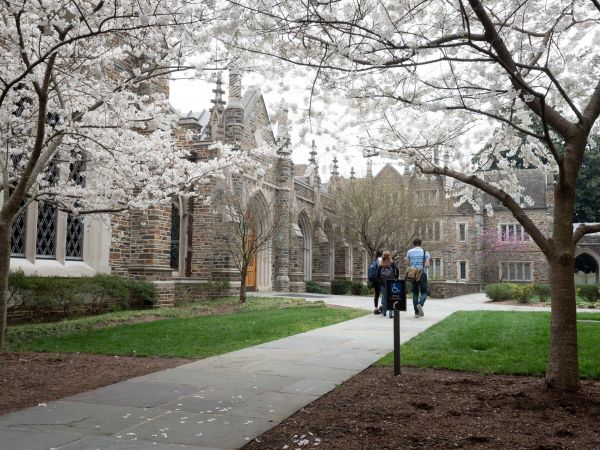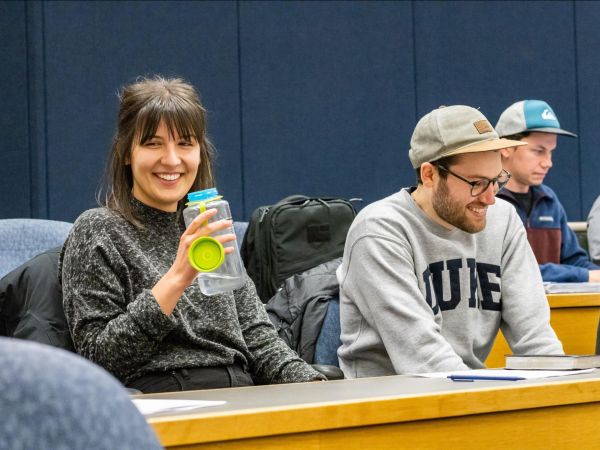Our combined four-year program in law and theology prepares students for ministries in a host of fields, such as advocacy for social justice issues and teaching. It also means students can graduate with degrees from both Duke Divinity and Duke Law in four years instead of five.
The Master of Theological Studies (M.T.S.) degree is tailored to fit the needs of students pursuing advanced doctoral studies or seeking careers in teaching or research. It also provides a strong foundation for students called to serve in lay ministry roles throughout the church, academy, and world. There are two curricular tracks available to students. M.T.S. Core is for those considering a wide variety of applications for their degree (including lay ministry, deacon's orders, nonprofit work, and secondary teaching) and who are seeking an all-around theological education in church history, biblical studies, and theology. All M.T.S./J.D. students complete the Core track.
Duke Law School offers a Juris Doctor (J.D.) program that provides a firm grounding in the core subjects of the study of law and rigorous training in legal analysis, reasoning, and writing. The program also combines traditional coursework with practical skills, clinics, research tutorials, and small seminars.
"I picked Duke because it was one of the few schools in the world that had the capability to form me as both an aspiring church leader and an attorney. Duke Divinity’s development of my Christian imagination and understanding of vocation has been invaluable to me."
Top Tier Faculty
Our faculty are top scholars in their field, and their work is at the cutting edge of research. Duke Divinity School faculty comprise five percent of total Duke University faculty, yet they account for 15% of the publications coming out of Duke University. Students benefit by studying directly with academics who are not only the best at what they do but dedicated to nurturing the next generation of thinkers and doers of theology. M.T.S. students work independently with a faculty member to craft their required thesis.
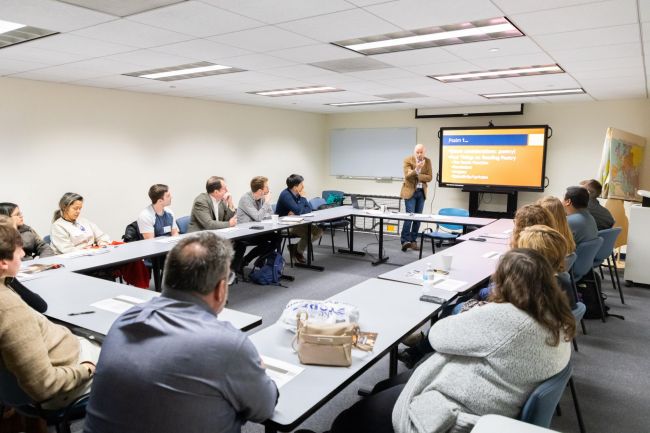
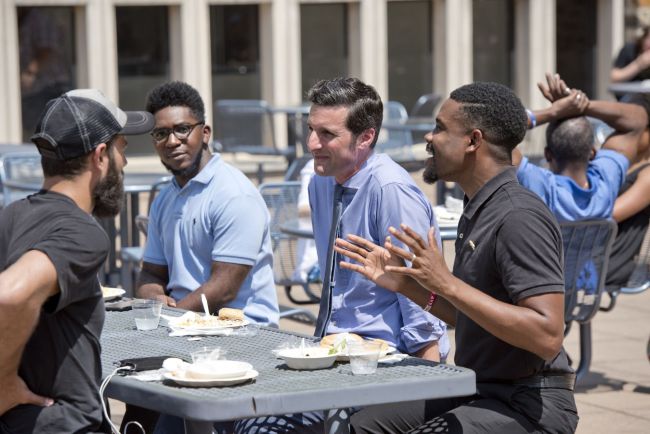
Mentoring for Doctoral Applications
Our M.T.S. degree program is a strong platform for students who plan to pursue further academic work. Our professors mentor students for the doctoral application process, providing support and feedback on research projects and support during the process. The M.T.S. program directors and cohort representatives hold various workshops to assist students in preparing for further graduate work.
Curriculum
Duke Divinity School’s academically rigorous curriculum—enriched by vibrant worship, opportunities for spiritual formation, the close-knit student community, and mentoring for the doctoral application process—makes the M.T.S. a premier program for those seeking preparation for their ministry to the world in an intentional Christian community, while the Duke Law J.D. is rigorous, innovative, and respected around the globe.
Students apply separately to each school. Upon acceptance, students enroll in either the Divinity School or the Law School for their first year, and the first-year curriculum is the same as that of other students in that school. In the second year, students complete the full first-year program of the other school. During the third and fourth years students take courses in both schools. However, approximately two-thirds of the courses will be in the Law School.
The Master of Theological Studies (M.T.S.) curriculum covers foundational areas of history, theology, and Scripture with the flexibility to pursue electives in one's area of interest. Students also complete a thesis under faculty direction during their final year.
Core courses include Old Testament, church history, New Testament, Christian theology, Christian ethics, and ministerial studies. Students can choose from a wide variety of electives ranging from New Testament Exegesis, to Christianity and Race, to Restorative Justice and the Church.
At the law school, first-year students begin their study of law through the traditional core courses of civil procedure, constitutional law, contracts, criminal law, property, and torts. At least one first-year course is a small section of less than 30 students and rarely does any first-year class exceed 90 students.
From the first-year foundation, Duke Law has built an extensive upper-class curriculum that blends traditional coursework with an extensive array of practical skills courses and clinics and opportunities to study in small groups with faculty.
Graduation Requirements
M.T.S.
- Twelve courses: Of these twelve courses, the Divinity School selects eight requirements, and the student may choose four electives.
- Thesis: Each student is required to write a paper that addresses the learnings or major emphases of the individual's program. The paper is submitted within a course during the final semester, fulfilling the requirements of both the course and the degree program.
- Student portfolio: All M.T.S. students are required to compile a portfolio consisting of certain papers with faculty feedback and student reflections. The portfolio serves to demonstrate the formation of the student in the areas of exegesis of Christian texts and the ability to think theologically.
J.D.
- Approximately 2/3 of the coursework is at Duke Law School.
- Student spends one full year at the law school and one full year at the divinity school (in either order). The final two years are blended.
- Visit the Duke Law website for more details about graduation requirements.
Center for Academic Support and Theological Writing
The Divinity School is committed to developing you as a writer. The Center for Writing and Academic Support provides services for writers of all abilities. In addition, we offer the RISE pre-orientation workshop to introduce the fundamentals of theological thought and writing; ongoing academic support workshops throughout the year; and tutors who are available to work with students one-on-one.


An education from Duke Divinity School is worth your investment, and you do not have to figure out the finances alone.
All M.T.S. students receive funding.
Duke Divinity School is investing in you, too. It is an investment in your education, the church, and our shared future. All M.T.S. students receive some form of scholarship support from Duke Divinity School that will cover between 25% and 100% of tuition costs, and there is no separate application needed in order to be considered. Many other internal and external scholarships, as well as federal financial aid in the form of work study and loans, make it possible for students to afford Duke Divinity. FAFSA should be completed for external aid. More information can be found in our Financial Aid section.
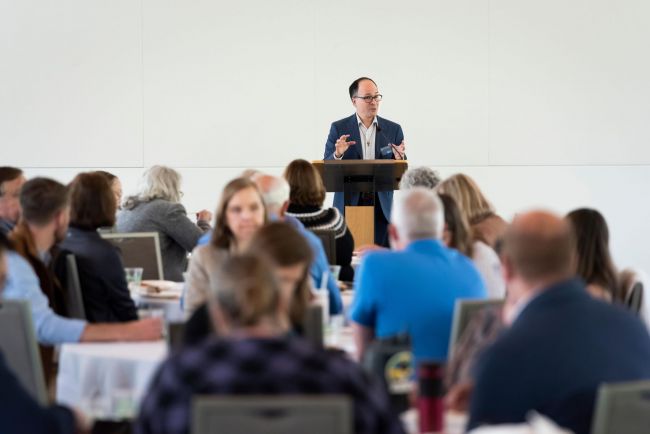
Lifelong Dividends
In addition to earning a degree from Duke Divinity School, you also receive benefits that continue to impact your life long after you leave. You will have access to the best academic resources in theological education and will use those tools throughout your career. Theses that are crafted with Duke Divinity faculty members become seeds that may grow into future doctoral projects. By being able to fully participate in a top tier research university, your scholarship can create room for surprising and creative interdisciplinary connections. The overwhelming majority of our students say their investment is worth it.
Ready for the Next Step?
Duke Divinity School accepts applications beginning in September and concluding with our third deadline on April 15. Our admissions requirements include demonstrated program goals commensurate with the M.T.S. degree program, a commitment to some form of diaconal or lay ministry, and a minimum GPA of 3.25 in a bachelor’s degree from a regionally accredited college or university prior to the intended date of enrollment.
Dr. Brent Strawn, D. Moody Smith Distinguished Professor of Old Testament at the Divinity School, has dual appointment with the Law School and would be happy to talk to interested students about this program.
Apply to the J.D.
Visit the Duke Law website to learn more about law school application requirements.
Request Info
Join our mailing list, and we'll send you more information.
Request Info about our programsVisit Campus
The best way to learn more about us is to visit. Schedule an in-person or online visit.
Visit Us

